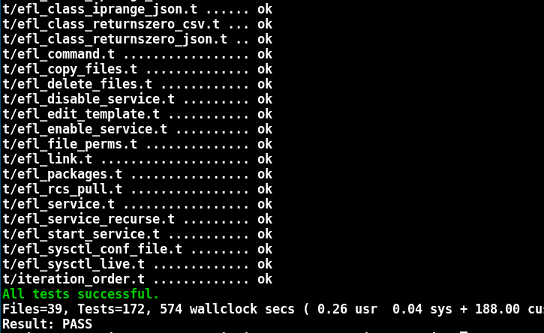Testing CFEngine policy using EFL, TAP, and Perl

It's a dirty secret that few test their CFEngine policies, and fewer still test them well. Now EFL has two bundles for testing that produce TAP output.
What is TAP?
The Test Anything Protocol was invented for unit testing Perl. It's simple yet powerful with a format like this:
(start test number)..(end test number)
(ok|not ok) (test number) - Test name in free form
Here's and example output:
R: efl_data_efl_test_vars_efl_global_strings_json_26ca18b4fe77f2fc4a494be
1..3
R: efl_data_efl_test_vars_efl_global_strings_json_26ca18b4fe77f2fc4a494be
ok 1 - main_efl_dev [Neil H. Watson (neil@watson-wilson.ca)]
R: efl_data_efl_test_vars_efl_global_strings_json_26ca18b4fe77f2fc4a494be
ok 2 - gateway [2001:DB8::1]
R: efl_data_efl_test_vars_efl_global_strings_json_26ca18b4fe77f2fc4a494be
ok 3 - cfe version [3]
Visually the reader can quickly understand results. The Perl utility prove will summarize them for you.
EFL comes with two testing bundles that generate TAP output via reports promises. Efl_test_classes tests if a class is defined or not, and efl_test_vars tests the value of a variable. Let's look at some examples. Note that I assume you have working CFEngine master framework policy and EFL installed
elf_test_classes
Suppose I want to test for the presence of the class am_middleware_host. Efl_test_classes takes a parameter file like this:
[
{
"class" : "test_for_am_middleware_host",
"class_to_test" : "am_middleware_host",
"test_type" : "is",
"name" : "Testing if 'am_middleware_host is set"
}
]
The test type works like Perl's Test::More module. Available test types are is, isnt, like, and unlike. The above test will pass if class_to_test is defined. Let's run it.
cf-agent -D run_test_suite,test_for_am_middleware_host
R: efl_test_classes_json_bbb9ad33c9792ef54f738a641bb72abfc75640a4
1..1
R: efl_test_classes_json_bbb9ad33c9792ef54f738a641bb72abfc75640a4
ok 1 - Testing if 'am_middleware_host is set
At this point you might say "Neil, why don't you just grep verbose output to see if the class is true?". Sure, that type of adhoc testing is fine, but the testing offered here is for automatic testing, so you can script this test using Perl's prove. Below we encapsulate the cf-agent command into cf-test.t because prove works by running files ending in .t and parsing TAP output.
#!/bin/sh
cf-agent -D run_test_suite,test_for_am_middleware_host
Now run it with prove:
prove ./cf-test.t
./efl_test_classes.t .. ok
All tests successful.
Files=1, Tests=1, 2 wallclock secs ( 0.02 usr 0.00 sys + 0.65
Result: PASS
Promises can be shown to kept, repaired, or not kept by using a classes attribute. So, if your promises define kept, repaired, or failed classes, then you can test for them in your test suite. Further, if you use ELF these classes are automatically defined:
body classes efl_rkn( promiser, handle )
{
promise_kept => { "${promiser}_handle_${handle}_kept" };
promise_repaired => { "${promiser}_handle_${handle}_repaired" };
repair_failed => { "${promiser}_handle_${handle}_notkept" };
repair_denied => { "${promiser}_handle_${handle}_notkept" };
repair_timeout => { "${promiser}_handle_${handle}_notkept" };
}
Now that you know the expected class outcome you can test for it. You can have test cases for any new policy.
elf_test_vars
Efl_test_vars is similar to efl_test_classes. You compare the value of a given variable against a give string or regex. Again it uses is, isnt, like, and unlike. Here's an example from EFL's own test suite:
[
{
"test_case" : "Neil H. Watson (neil@watson-wilson.ca)",
"test_type" : "is",
"class" : "any",
"name" : "main_efl_dev [${efl_global_strings.main_efl_dev}]",
"var_to_test" : "${efl_global_strings.main_efl_dev}"
},
{
"test_type" : "is",
"class" : "any",
"name" : "gateway [${efl_global_strings.gateway}]",
"var_to_test" : "${efl_global_strings.gateway}",
"test_case" : "2001:DB8::1"
},
{
"test_case" : "3",
"test_type" : "is",
"class" : "any",
"var_to_test" : "${efl_global_strings.cf_major}",
"name" : "cfe version [${efl_global_strings.cf_major}]"
}
]
This data is used by EFL's test suite to test that the bundle efl_global_strings correctly defines variables. Here's the raw output:
t/31_efl_global_strings_json.t
R: efl_data_efl_test_vars_efl_global_strings_json_26ca18b4fe77f2fc4a494be0
1..3
R: efl_data_efl_test_vars_efl_global_strings_json_26ca18b4fe77f2fc4a494be0
ok 1 - main_efl_dev [Neil H. Watson (neil@watson-wilson.ca)]
R: efl_data_efl_test_vars_efl_global_strings_json_26ca18b4fe77f2fc4a494be0
ok 2 - gateway [2001:DB8::1]
R: efl_data_efl_test_vars_efl_global_strings_json_26ca18b4fe77f2fc4a494be0
ok 3 - cfe version [3]
And here's the output from prove:
prove t/31_efl_global_strings_json.t
t/31_efl_global_strings_json.t .. ok
All tests successful.
Files=1, Tests=3, 1 wallclock secs ( 0.03 usr 0.00 sys + 0.88 cusr
Result: PASS
I hope this has given you some ideas on how you can improve your policy testing. Feel free to contact me if you have questions or if you'd like a consulting engagement. Happy testing!
